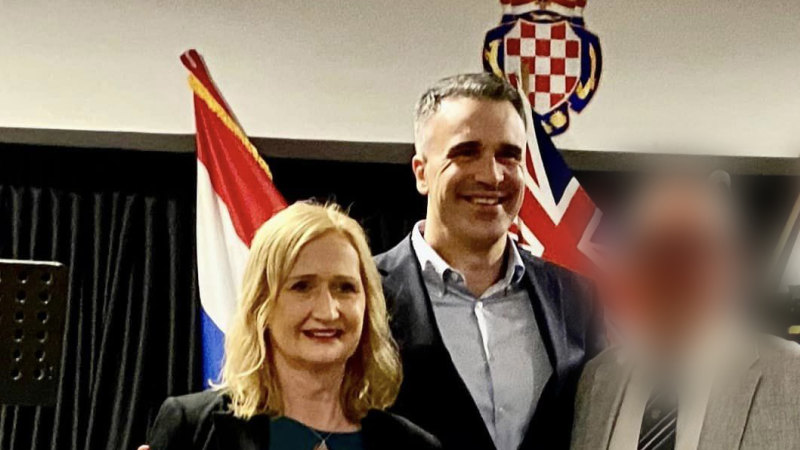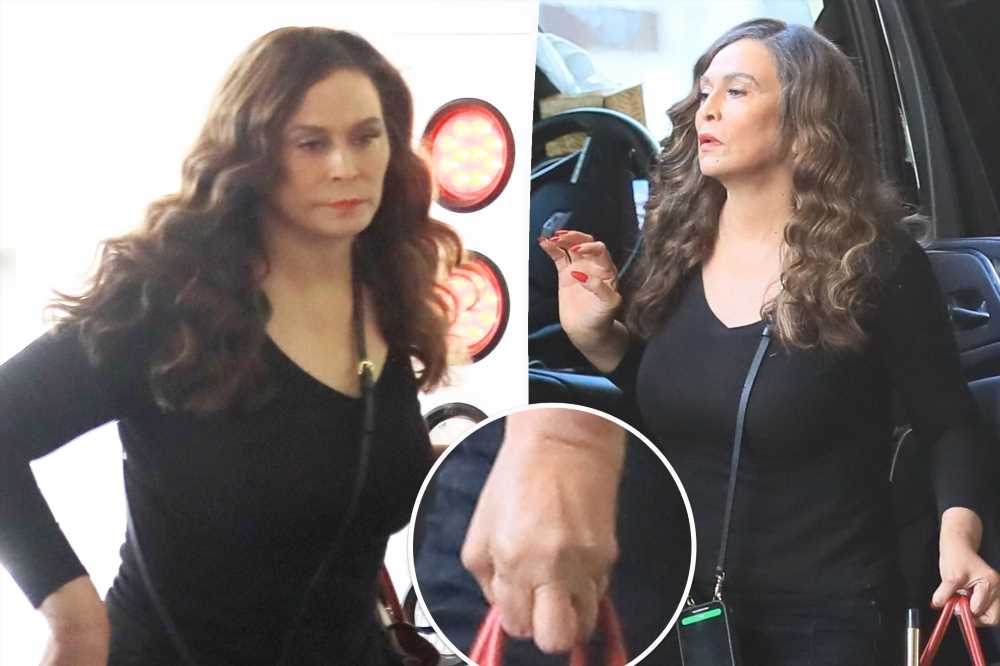Save articles for later
Add articles to your saved list and come back to them any time.
State governments have pledged grants worth more than $2 million to Croatian clubs that openly display fascist symbols and commemorate anniversaries linked to the Nazi-backed Ustasha regime of WWII.
Governments in Victoria, South Australia and the ACT have in the past year pledged grants to Croatian clubs that display pictures of Ustasha dictator Ante Pavelic on their walls and celebrate the anniversary of the creation of the puppet state.
South Australian Premier Peter Malinauskas pledging $1.5 million to the Adelaide Croatian Sports Centre in May.Credit: Facebook
The regime is estimated to have killed half a million people, including Serbs, Jews and Romani people, and is widely regarded as having committed genocide.
An investigation by this masthead published last month detailed how some key Croatian institutions in Victoria and NSW commemorate the regime, prompting condemnation from the Croatian ambassador to Australia, Betty Pavelich, and leading Jewish groups. It also sparked strong interest from the Balkans and the investigation has since been translated and reproduced or referenced on at least 10 news sites in Croatia, Serbia and Bosnia.
Further research by The Age, as well as anti-fascist researchers White Rose Society, shows clubs in South Australia and the ACT also have similar fascist paraphernalia. These clubs, along with a major soccer club in Victoria have been awarded significant taxpayer-funded grants.
Patrons at the Adelaide Croatian Sports Centre, including president Juli Cirjak, have been pictured on social media wearing caps and T-shirts with the “U” Ustasha symbol. The club also appears to have a portrait of Pavelic on the wall.
A portrait of Ante Pavelic on the wall of the Adelaide Croatia Sports Centre in 2020.Credit: Facebook
This masthead is not suggesting that Cirjak sympathises with the Ustasha regime or supports its actions, only that the appropriateness of her behaviour as a leader of a group receiving public funding warrants scrutiny. She declined to comment when asked about the photograph.
It uses the phrase “za dom spremni” in club communications and on social media, which means “For homeland, ready”, and was a slogan used by the Ustasha. Its use can attract fines in modern-day democratic Croatia.
The sports club, which is home to the football team the Adelaide Croatia Raiders, also annually celebrates April 10, known as Deseti Travanj, the anniversary of the creation of the Nazi-backed Croatian state.
In May, South Australian Premier Peter Malinauskas presented the sports centre with a $1.5 million grant as part of the state budget.
A government spokesman said that the South Australian Multicultural and Ethnic Affairs Commission has provided financial and other support to multicultural communities for four decades, and that support does not endorse the actions or glorification of extremist views within any community.
Adelaide Croatians Sports Centre president Juli Cirjak wearing a cap with the Ustasha symbol on it in 2016.Credit: Facebook
He said the Adelaide Croatia Raiders values statement says that racism, racial vilification or harassment is unacceptable, that the club embraces all members of the community, and its code of conduct states it will provide an inclusive, supportive and safe environment for every child.
“These are the values that align with modern Croatia,” he said. “The state government will continue to work with the Croatian community to promote those ideals and not the extremist views of the past.”
The Adelaide Croatian Sports Centre and Cirjak declined to comment.
The Australian Croatian Club O’Connor, located in Canberra, also has a picture of Pavelic on the wall, as well as portraits of other Ustasha commanders, and the HOP emblem, which stands for “hrvatski oslobodilački pokret”, the far-right political party founded in Argentina in 1956 by Pavelic.
The club uses the catchcry “za dom spremni” in sign-offs on letters, banners in the club, and hashtags on social media, and hosts Deseti Travanj celebrations.
The fascist links at the Melbourne Knights soccer club have previously been detailed by this masthead. On April 10 this year, six men were filmed at the soccer club doing stiff armed salutes as they sang a song extolling the Ustasha.
The club announced in November last year that it would be upgrading its stadium with the help of a $750,000 grant from the Victorian state government.
A Victorian government spokeswoman said the grant had been pledged but is yet to be administered. The grants remain under assessment by the Multicultural Community Infrastructure Fund.
“Everyone deserves to feel safe, welcome and included in Victoria and we are committed to protecting the rights of all Victorians to be free from racism, vilification and discrimination of any kind,” she said. “Victorians have zero tolerance of glorifying hateful ideology.”
The ACT government pledged $75,000 to the Canberra club for energy-efficient upgrades, which was announced by ACT Minister for Emissions Reduction Shane Rattenbury, in March. The grants funded air-conditioning, insulation and electric vehicle charger upgrades.
Rattenbury said the ACT government had not been aware of any concerns relating to alleged fascist iconography in Canberra clubs until the inquiry from The Age.
“At the time of the grants being provided, these concerns were not made apparent to the directorate which administers the grants. Further, ministers have no involvement in the grants process as a standard practice across the ACT government,” he said.
Patrons at the Australian Croatian Club O’Connor in Canberra wearing t-shirts with the phrase “za dom spremni”. Credit: Facebook
“Noting the sensitive nature of the allegations, I have raised this matter with Minister Tara Cheyne and recommend raising any further concerns about human rights with her office.”
The club declined to comment.
In 2016, the ACT Administrative Appeals Tribunal ordered the club to pay $63,000 to member Danijel Kovac, after it found he had been discriminated against and treated unfavourably by the organisation, which did not renew his membership in 2011 in part because of his political convictions.
The tribunal heard that Kovac disagreed with the use of the phrase “za dom spremni”, the “U” Ustasha symbol, and the celebration of April 10 and Pavelic’s death, and believed the club should display symbols and flags associated with the current democratic Croatian government.
According to the judgment, at an annual general meeting in 2008, the club voted to remove the pictures of Pavelic and other WWII-era leaders from the main hall because they were controversial and divisive. However, several months later, a new interim board overturned the decision.
During the proceedings, the club described the portraits, slogans, symbols and emblems associated with the WWII independent state as “apolitical nostalgia” which was part of the organisation’s “proud Croatian strategic direction”.
Many of the experts interviewed for the investigation said views in sections of the Croatian diaspora in Australia were much more extreme than in modern-day Croatia, with displays of support for fascism more open and mainstream.
War crimes researcher Mark Aarons said last month that only a minority of the Croatian community hold pro-Ustasha views but contends the links continue today in some form.
“You couldn’t get a group at the soccer all giving the Nazi-era salute ‘za dom, spremni’ if there wasn’t a coherent organisation that … taught them that this is what they are and that we go back to Ante Pavelic.”
Aarons says such views are abhorrent. “If you still had a major faction of the German community in Australia revering Adolf Hitler and excusing the slaughter of Jews, Gypsies and political opponents under the Nazi regime, there would be absolute outrage at every level of society,” he says.
The open celebration of this fascist past raises questions about how broad state and federal bans on the celebration of Nazism and fascism should be. Those who celebrate April 10 or the Ustasha often describe it as an expression of Croatian independence rather than fascism.
Representatives of the Jewish community in Australia want authorities to have more ability to crack down on Nazi-linked symbols, including Ustasha ones.
The Victorian government introduced legislation which makes it a criminal offence to intentionally display the Nazi swastika in public, with penalties of up to $22,000 or 12 months in prison. It has committed to broadening the legislation to include the Nazi salute.
An online store openly selling Ustasha-themed memorabilia such as key rings, T-shirts, beanies and stickers removed much of the concerning material after queries were raised by The Age with the young woman behind the business.
Sydney United was also beset by scandal after three fans were charged for making Nazi salutes at last October’s Australia Cup soccer final, while nearby another fan flew the Ustasha flag.
The club apologised for the actions of the fans and representatives of the club and the Jewish community met recently at the Sydney Jewish Museum. Head coach Miro Vlastelica described the visit to the museum as a “humbling experience” and “very educational” about the struggles of the Jewish people and others during the war.
The Morning Edition newsletter is our guide to the day’s most important and interesting stories, analysis and insights. Sign up here.
Adelaide Croatians Sports Centre president Juli Cirjak wearing a cap with the Ustasha symbol on it in 2016.Credit: Facebook
Most Viewed in Politics
From our partners
Source: Read Full Article






